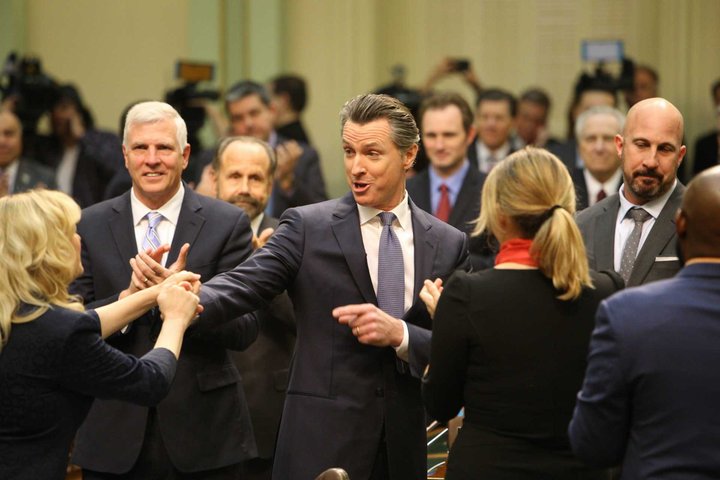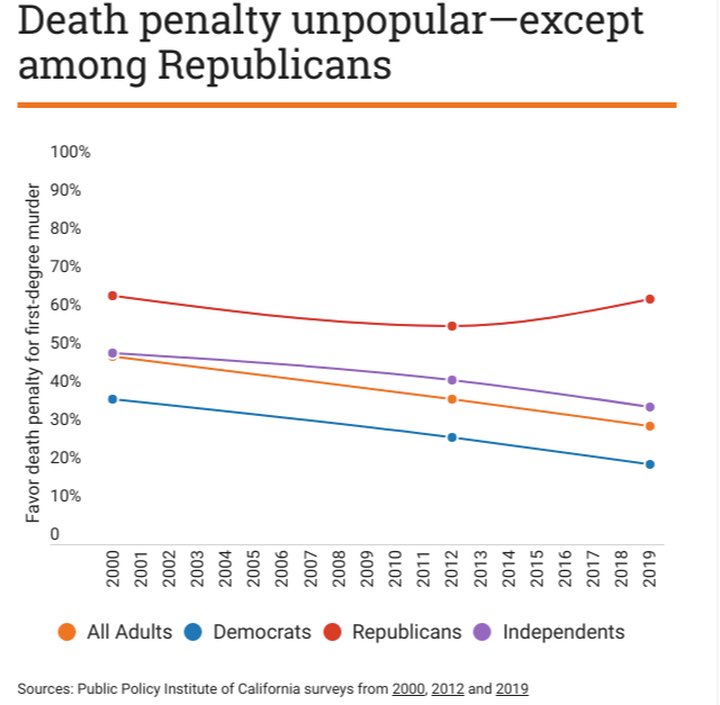
Gov. Gavin Newsom at the State of the State. Photo by Andrew Nixon, Capital Public Radio
Ever
since Gov. Gavin Newsom decided to halt
capital punishment in California earlier this month, his political
foes — and even a few supporters — have been lambasting him for his
“arrogance”
in “defying,”
“thwarting,”
and “kissing
off” the state’s voters.
Two weeks later, a new poll which suggests that his moratorium might be more in line with public sentiment than maybe even he suspected. And that’s just one of several questions that found a majority of Californians aligned with their new governor — although they also say they’re already paying more than they ought to be in taxes.
According to the Public Policy Institute of California survey, a majority of likely voters favor life imprisonment with no possibility of parole over the death penalty as a punishment for first-degree murder — 58 to 38 percent. When the pollsters asked all California adults, including those who are either not allowed to or not inclined to vote, the share preferring capital punishment dropped to a mere 31 percent.
That’s the lowest level of support for the death penalty since the institute began asking nearly two decades ago, said its president Mark Baldassare. With one exception.
“Republicans were the only group of all the demographic groups — region, race, ethnic — where support (for the death penalty) actually went up,” said Baldassare. “Partisan polarization is increasing and it’s increasing on this question as well.”
Newsom announced his freeze on executions earlier this month, saying that he could not “sign off on executing hundreds and hundreds of human beings,” particularly given the possibility that some could be innocent.
That’s inconsistent with Newsom’s statements on the campaign trail when he told CALmatters that he didn’t “want to get in front of the will of the voters” on the issue. In November 2016, California voters rejected a ballot proposition to end the death penalty — 53-to 47 percent. Voters nixed a similar abolition attempt in 2012 by a comparable margin.

Today’s poll suggests that a similar measure could fare differently — and voters may soon have an opportunity to find out. The day after Newsom announced his moratorium, Assemblyman Marc Levine, a Democrat from Marin, introduced another constitutional amendment to end capital punishment. If passed by two-thirds of both state legislative chambers, it would go on the 2020 ballot.
While the poll offers good news for Newsom, it does come with a caveat. Voters could very well support life imprisonment over the death penalty but still disapprove of the governor’s unilateral moratorium. The pollsters did not ask about the policy shift specifically, which was announced just as the survey was starting.
Either way, Newsom seems to have plenty of goodwill to fall back on. More Californians approve of the new governor than disapprove of him — a net positive of 9 points among likely voters and 19 points among all adults surveyed.
The vast majority of Californians also seem to support even the governor’s most contentious and expensive policy plans, including his proposals to boost funding for the earned income tax credit, housing construction and wildfire preparedness, to offer subsidized health insurance to low-income undocumented immigrants below the age of 26 and to reduce the scale of the high-speed rail project.
“People are giving him the benefit of the doubt right now that he knows what he’s doing,” said Baldassare.
While many of these proposals carry big price tags, 60 percent of respondents nevertheless said that their tax bills are already “somewhat” or “much” larger than they ought to be.
Other notable findings from today’s poll:
- A record low number of voters consider the amount that state and local governments spend on public sector pension benefits to be a “big problem.”
- Disapproval of President Donald Trump sits at 67 percent of all Californians. A poll at this time last year put the number at 65 percent.
- By a slim margin of 45 to 40 percent, Californians believe that Sen. Kamala Harris should not run for president, with 15 percent undecided. Half of political independents fell into the “no” camp.
- Only 21 percent support President Trump’s declaration of a national emergency to fund additional wall construction along the southern border.
###
CALmatters.org is a nonprofit, nonpartisan media venture explaining California policies and politics.
CLICK TO MANAGE